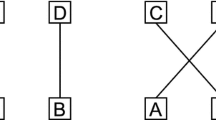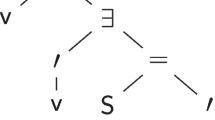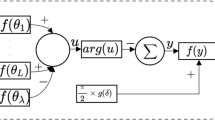Abstract
It can be intuitively understood that sets and their elements in mathematics reflect the atomistic way of thinking in physics: Sets correspond to physical properties, and their elements correspond to particles that have these properties. At the same time, quantum statistics and quantum field theory strongly support the view that quantum particles are not individuals. Some of the problems faced in modern physics may be caused by such discrepancy between set theory and physical theory. The question then arises: Is it possible to reconstruct the concept of set as a collection of objects that model quantum particles rather than as a mere collection of individuals? David Deutsch has argued that identical entities can be diverse in their attributes, and that this nature, what he calls fungibility, must lie at the heart of quantum physics. In line with this idea, a set theory with fungible elements is established, and the collection of such sets is shown to be endowed with an ortholattice structure, which is better known as quantum logic.
Similar content being viewed by others
Notes
Since two indistinguishable individuals could be distinct, it may appear that Leibniz’s Principle of the Identity of Indiscernibles (PII) is violated. It is possible, however, to defend PII by invoking the principle of impenetrability, which is tacitly supposed in classical physics.
Still, if PII were abandoned, individuality could be retained.
In Deutsch’s own words, “\(\dots\) when a random outcome (in this sense) is about to happen, it is a situation of diversity within fungibility: the diversity is in the variable ‘what outcome they are going to see”’ (Deutsch 2011a).
The converse of PII, the Indiscernibility of Identicals, conflicts with the fungibility.
\(R(w,w')\) if and only if \(w\) is fungible with \(w'\).
This immediately gives rise to the problem of transworld identity, that is, the problem of how an individual in w can be said to be identical to an individual in \(w'\). Our approach to this problem is to stipulate, following what Lewis did in his counterpart theory (Lewis 1986), that the fungibility be a similarity relation.
U(w) and \(U(w')\) are isomorphic if and only if there exists a bijection \(\varphi : U(w) \longrightarrow U(w')\).
This means that all \(r(w,w')\)’s are bijections.
We write \(\bigcap _{w'\in W} r(w',w)(X(w'))\) as shorthand for \(\bigcap _{w' \in W }(\{ r(w',w)(y) \mid y \in X(w') \})\) and write \(\bigcup _{w'\in W} r(w',w)(X(w'))\) as shorthand for \(\bigcup _{w' \in W }(\{ r(w',w)(y) \mid y \in X(w') \})\). For \(w',w \in W\) such that \(R(w',w)\) does not hold, \(r(w',w)(X(w'))\) is regarded as \(\emptyset\).
This step is not straightforward. For example, the RHS is worked out as follows: \((\bigcup _{w' \in W} r(w',w) ([A](w')))^c=(\bigcup _{w' \in W}(\{ r(w',w)(y) \mid y \in [A](w')\}))^c = \bigcap _{w' \in W}(\{ r(w',w)(y) \mid y \in [A](w')\}^c) = \bigcap _{w' \in W} \{ r(w',w)(y) \mid y \in [A](w')^c\}=\bigcap _{w' \in W}r(w',w)([A](w')^c)\). Here the second last equality follows from the fact that \(r(w',w)\) is a bijection. We will omit such details in the rest of the paper.
We confine ourselves to dealing with ‘small’ sets here in order to avoid Russell’s paradox.
Here \(\subseteq\) denotes the usual inclusion relation.
The second part can be proved exactly in the same way.
On the other hand, there has been much controversy whether such quantum logic based on the lattice of closed subspaces in a Hilbert space is really entitled to be referred to as the basis of quantum physics (Jammer 1974).
References
da Costa NCA, French S, Krause D (1992) The Schrödinger problem. In: Bibtol M, Darrigol O (eds) Erwin Schrödinger, Philosophy and the birth of quantum mechanics. Editions Frontieres, Gif-sur-Yvette, pp 445–460
Dalla Chiara ML, Toraldo di Francia G (1993) Individuals, kinds and names in physics. In: Corsi G, Dalla Chiara ML, Ghirardi G (eds) Bridging the gap: philosophy, mathematics, and physics. Kluwer Academic Publisher, Dordrecht, pp 261–283
Dalla Chiara ML, Giuntini R, Battilotti G, Faggian C (2002) Quantum logics. In: Gabbay DM, Guenther F (eds) Handbook of philosophical logic, vol 6, 2nd edn. Kluwer Academic Press, Dordrecht
Deutsch D (1997) The fabric of reality: the science of parallel universes-and its implications. Allen Lane, London
Deutsch D (2010) Apart from Universes. In: Saunders S, Barrett J, Kent A, Wallace D (eds) Many worlds? Everett, quantum theory and reality. Oxford University Press, Oxford, pp 542–552
Deutsch D (2011a) The beginning of infinity: explanations that transform the world. Allen Lane, London
Deutsch D (2011b) Fungibility and the quantum multiverse. Phys World 24(5):34–38
French S, Krause D (2006) Identity in physics : a historical, philosophical, and formal analysis. Oxford University Press, Oxford
Goldblatt R (1974) Semantics analysis of orthologic. J Philos Logic 3:19–35
Jammer M (1974) Philosophy of quantum mechanics: the interpretations of quantum mechanics in historical perspective. Wiley, New York
Lewis DK (1986) On the plurality of worlds. Blackwell Publishers, Oxford
Manin YI (1977) A course in mathematical logic. Springer, Berlin
Author information
Authors and Affiliations
Corresponding author
Rights and permissions
About this article
Cite this article
Tokuo, K. Fungibility in Quantum Sets. Axiomathes 29, 297–310 (2019). https://doi.org/10.1007/s10516-018-9397-z
Received:
Accepted:
Published:
Issue Date:
DOI: https://doi.org/10.1007/s10516-018-9397-z




